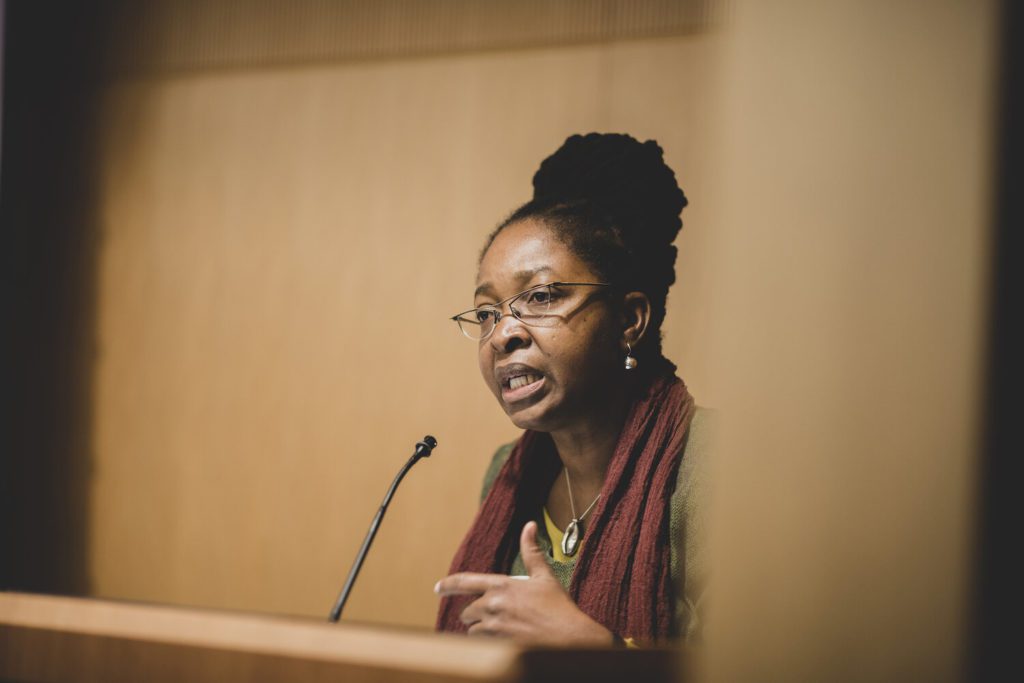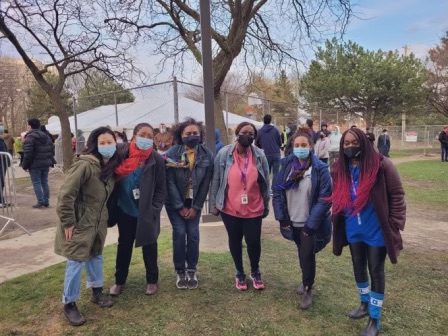Advocacy was an inevitable path for Angela Robertson, executive director of Parkdale Queen West Community Health Centre in Toronto. It runs in her family, she says. It is her calling, her purpose and as an immigrant to Canada, it became her passion and her life’s work.
The pandemic has driven her advocacy to new levels as co-lead of the Toronto region COVID-19 homelessness/shelter working group and as a determined advocate for homeless, racialized and disadvantaged communities hardest hit by the pandemic.
While Robertson says the pandemic has severely challenged at-risk groups, she notes it has also “pushed open a window,” allowing community leaders to address some of the systemic problems rarely questioned pre-pandemic.
“I can say that I may have been physically tired in this pandemic, but I have not been weary. I see this moment as a moment to push for real, substantive, tangible change,” she says. “The pandemic has pushed open a window slightly to advance those changes and I, and others, are leaning in and wedging our bodies into that window to push (it) wide open to create more sites of change.”
Robertson notes that she was reminded of one of the quotes of U.S. civil rights activist John Lewis when he died in July 2020: “Get in good trouble, necessary trouble.”
“I thought that was a marker for me, that I would use this moment to make good trouble wherever I go,” says Robertson. “So, I have been unrelenting in making good trouble.”
Robertson says her passion for advocacy comes from strong female figures in her childhood and young adulthood. While growing up in Jamaica, her mother came to Canada as part of the Caribbean domestic workers program, known as the West Indian Domestic Scheme, leaving Robertson to be raised by her grandmothers.
She joined her mother years later in Toronto and says growing up knowing that her mother worked in conditions rife with exploitation to create opportunity for her family was additional fuel. She later learned about workers’ experiences dealing with exploitation in the program – stories that highlighted what Robertson says continue to be problematic “north/south” racialized divides in Canadian spaces.
“Just that awareness for me, foundationally, was important … I think what was instrumental was that it led me to seek out activism spaces,” says Robertson. “I joined this group called the Black Women’s Collective, which was a feminist, activist collective here in the city, in the late ‘80s, into the ‘90s. (They) really had an intersectional approach to community mobilizing, to doing community work, community activism.”
“I have been unrelenting in making good trouble.”
Part of what made Robertson a perfect fit as co-lead of the Toronto region COVID-19 homelessness/shelter working group was her ongoing work at the Parkdale Queen West Community Health Centre, where one of the priority populations includes those using the sheltering system and harm reduction services.
“I have been loud about these issues,” says Robertson. “The pandemic did not create the systemic inequalities that folks are experiencing … I think the pandemic unveiled and spotlighted the inadequacy of the infrastructure support that low-income people need, and that homeless folks need.”

Angela Robertson’s Black Experiences in Health Care Symposium keynote speech. Courtesy of https://www.healthcommons.ca/
She notes that a significant problem has been the lack of comprehensive programs addressing what some experts have called the double or triple pandemic– where, in addition to the challenges of the COVID-19 crisis, vulnerable groups are forced to deal with added challenges such as marginalization, socio-economic stress, racism, lack of care and consideration from provincial or local health officials.
This is something Robertson says she saw in other countries, and specifically the U.S., as early as March 2020.
“We knew at the start of the pandemic that what we began to see in America would be what would happen here in Canada, which was the higher rates of COVID among Black, Indigenous, racialized, low-income populations,” she says.
Ontario’s lack of race-based socio-economic data proved to be a stumbling block, she adds.
“We have had (a) really lackluster approach to this data collection,” says Robertson. “We had a chief medical officer who initially said that everybody would access (care) and be impacted equally, so there was really no need in Ontario for the collection of risk-based data. And the evidence proved him contrary. Because what the evidence showed is that racialized, Black populations, Indigenous populations, were differentially impacted at higher rates, with higher rates of hospitalization and death.”
The vaccine rollout also created alarm. Despite evidence identifying higher rates of COVID-19 cases, hospitalizations and socio-economic deprivation in marginalized communities, she says there was an absence of “commensurate rolling out of the vaccines” to those communities.
“That was a significant disappointment,” says Robertson. “That is where I and others felt an abiding urgency to push the system and to find and make (it) possible to get vaccines to provide to those communities.”
“We knew at the start of the pandemic that what we began to see in America would be what would happen here in Canada.”
She describes herself as “rabid” in pushing for a strategy for access to “no waste” doses. She supported hotspot vaccination clinics, like the one at the Black Creek Community Health Centre run by Robertson’s friend, colleague and fellow Pillars of the Pandemic winner Cheryl Prescott, and simultaneously managed the Parkdale Queen West Community Health Centre, ensuring that its doors would remain open.

Angela – second from the left – with other ‘good troublemakers’ at Black Creek CHC vaccination pop-up clinic. Provided by Angela Robertson and depicted in the artist’s rendering above.
Maintaining the centre’s accessibility to those who need access to washrooms, overdose prevention services, healing programs, support circles and shelter – despite the risks associated with COVID-19 transmission – has been an important mission, says Robertson.
“I always feel that we need to be present and we need to show up for the people with whom we are in alliance,” she says. “And I therefore see my role as an executive director to be very much present with the staff doing that work.”
Although she has been putting in 12-hour days at the centre, she says she feels as though she is exactly where she needs to be.
“My family … they think I’m relentless. They may want me to rest and have this thing called work-life balance. And I chuckle at that because there is a statement that I live by as well, which is not mine, but a statement by an African-American civil rights justice leader, Ella Baker: ‘We who believe in freedom cannot rest until it comes.’”


The comments section is closed.